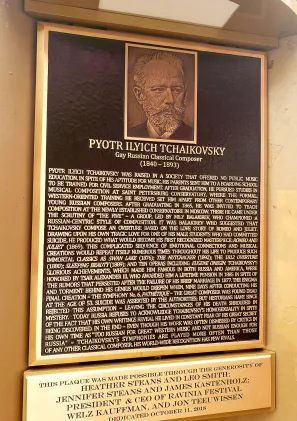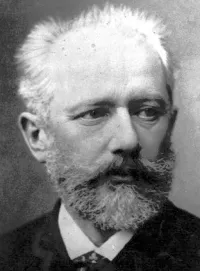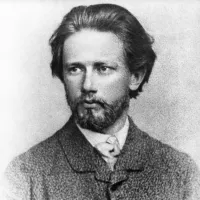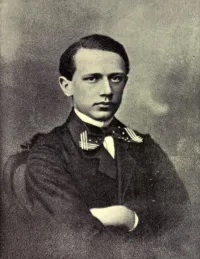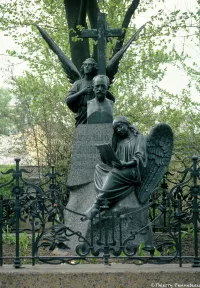Plaque Sponsor
Heather Steans and Leo Smith; Jennifer Steans and James Kastenholz; President and CEO of Ravinia Festival Welz Kauffman; and Jon TeeuwissenBiography
1840 - 1893
“The creative process is like music which takes root with extraordinary force and rapidity.”
- Pyotr Ilyich Tchaikovsky
Pyotr Ilyich Tchaikovsky was raised in a society that offered no public music education. In spite of his aptitude for music, his parents sent him to a boarding school to be trained for civil service employment. After graduation, he pursued studies in musical composition at Saint Petersburg Conservatory, where the formal, Western-oriented training he received set him apart from other contemporary young Russian composers. After graduating in 1865, he was invited to teach composition at the newly established Conservatoire in Moscow. There he came under the scrutiny of “The Five” – a group, led by Mily Balakirev, who championed a Russian-centric style of composition. It was Balakirev who suggested that Tchaikovsky compose an overture based on the love story of Romeo and Juliet. Drawing upon his own tragic love for one of his male students who had committed suicide, he produced what would become his first recognized masterpiece: Romeo and Juliet (1869). This complicated sequence of emotional connections and musical creations would repeat itself numerous times throughout his life to produce such immortal classics as Swan Lake (1876); The Nutcracker (1892); the 1812 Overture (1880); Sleeping Beauty, (1889); and ten operas including Eugene Onegin. Tchaikovsky’s glorious achievements, which made him famous in both Russia and America, were honored by Tsar Alexander III, who awarded him a lifetime pension in 1885 in spite of the rumors that persisted after the failure of his brief marriage in 1877. The enigma and torment behind his genius would deepen when, nine days after conducting his final creation – the Symphony No. 6, Pathétique – the great composer was found dead at the age of 53. Suicide was asserted by the authorities; but historians have since rejected this assumption – leaving the circumstances of his death shrouded in mystery. Today Russia refuses to acknowledge Tchaikovsky’s homosexuality in spite of the fact that his own writings reveal he lived in constant fear of his great secret being discovered. In the end – even though his work was often dismissed by critics in his own time as “too Russian for great Western music and not Russian enough for Russia” – Tchaikovsky's symphonies are played more often than those of any other classical composer. His world-wide recognition has few rivals.
Pyotr Ilyich Tchaikovsky Bronze Memorial
1840 - 1893
“The creative process is like music which takes root with extraordinary force and rapidity.”
- Pyotr Ilyich Tchaikovsky
Pyotr Ilyich Tchaikovsky was raised in a society that offered no public music education. In spite of his aptitude for music, his parents sent him to a boarding school to be trained for civil service employment. After graduation, he pursued studies in musical composition at Saint Petersburg Conservatory, where the formal, Western-oriented training he received set him apart from other contemporary young Russian composers. After graduating in 1865, he was invited to teach composition at the newly established Conservatoire in Moscow. There he came under the scrutiny of “The Five” – a group, led by Mily Balakirev, who championed a Russian-centric style of composition. It was Balakirev who suggested that Tchaikovsky compose an overture based on the love story of Romeo and Juliet. Drawing upon his own tragic love for one of his male students who had committed suicide, he produced what would become his first recognized masterpiece: Romeo and Juliet (1869). This complicated sequence of emotional connections and musical creations would repeat itself numerous times throughout his life to produce such immortal classics as Swan Lake (1876); The Nutcracker (1892); the 1812 Overture (1880); Sleeping Beauty, (1889); and ten operas including Eugene Onegin. Tchaikovsky’s glorious achievements, which made him famous in both Russia and America, were honored by Tsar Alexander III, who awarded him a lifetime pension in 1885 in spite of the rumors that persisted after the failure of his brief marriage in 1877. The enigma and torment behind his genius would deepen when, nine days after conducting his final creation – the Symphony No. 6, Pathétique – the great composer was found dead at the age of 53. Suicide was asserted by the authorities; but historians have since rejected this assumption – leaving the circumstances of his death shrouded in mystery. Today Russia refuses to acknowledge Tchaikovsky’s homosexuality in spite of the fact that his own writings reveal he lived in constant fear of his great secret being discovered. In the end – even though his work was often dismissed by critics in his own time as “too Russian for great Western music and not Russian enough for Russia” – Tchaikovsky's symphonies are played more often than those of any other classical composer. His world-wide recognition has few rivals.
Pyotr Ilyich Tchaikovsky Bronze Memorial
Lesson Plan
Please login or register for an account to view this lesson plan.
Demography
Demography
Gender Male
Sexual Orientation Gay
Gender Identity Cisgender
Ethnicity Caucasian/White
Faith Construct Atheist
Nations Affiliated Russia
Era/Epoch Russia Empire (1721-1917)
Field(s) of Contribution
Academics
Art, Music, Literature & Theater
Education
Journalism
Media & Communications
Music
Social Sciences
World History
Commemorations & Honors
Tsar Alexander III Bestowed Order of St. Vladimir on Tchaikovsky (1884)
Tsar Alexander III Awarded Tchaikovsky Lifetime Pension (1885)
Google Doodle Commemorating Tchaikovsky's 170th Birthday (2010)
Demography
Gender Male
Sexual Orientation Gay
Gender Identity Cisgender
Ethnicity Caucasian/White
Faith Construct Atheist
Nations Affiliated Russia
Era/Epoch Russia Empire (1721-1917)
Field(s) of Contribution
Academics
Art, Music, Literature & Theater
Education
Journalism
Media & Communications
Music
Social Sciences
World History
Commemorations & Honors
Tsar Alexander III Bestowed Order of St. Vladimir on Tchaikovsky (1884)
Tsar Alexander III Awarded Tchaikovsky Lifetime Pension (1885)
Google Doodle Commemorating Tchaikovsky's 170th Birthday (2010)
Resources
Resources
Henry, Seán. "Peter Ilich Tchaikovsky." Gay and Lesbian Biography. Michael J. Tyrkus, ed. Detroit, Mich.: St. James Press, 1997. 427-429.
Holden, Anthony. Tchaikovsky: A Biography. New York: Random House, 1995.
Jackson, Timothy L. "Aspects of Sexuality and Structure in the Later Symphonies of Tchaikovsky." Music Analysis 14.1 (March 1995): 3-25.
McClary, Susan. Feminine Endings: Music, Gender, and Sexuality. Minneapolis: University of Minnesota Press, 1991.
Karlinsky, Simon. "Tchaikovsky, Pyotr Ilich." Gay Histories and Cultures. George Haggerty, ed. New York: Garland, 2000. 865-866.
Poznansky, Alexandre. Tchaikovsky's Last Days: A Documentary Study. Oxford: Clarendon Press, 1996.
Poznansky, Alexandre. Tchaikovsky: The Quest for the Inner Man. New York: Schirmer, 1991.
Wiley, John Roland. "Tchaikovsky, Pyotr Ilyich." The New Grove Dictionary of Music and Musicians. Stanley Sadie, ed. London: Macmillan, 2001. 25:144-183.
http://rictornorton.co.uk/tchaikov.htm
https://www.outinperth.com/tchaikovskys-romantic-gay-love-letters-revealed/
https://www.advocate.com/news/world-news/2013/09/04/putin-tchaikovski-was-gay-so-what
Resources
Henry, Seán. "Peter Ilich Tchaikovsky." Gay and Lesbian Biography. Michael J. Tyrkus, ed. Detroit, Mich.: St. James Press, 1997. 427-429.
Holden, Anthony. Tchaikovsky: A Biography. New York: Random House, 1995.
Jackson, Timothy L. "Aspects of Sexuality and Structure in the Later Symphonies of Tchaikovsky." Music Analysis 14.1 (March 1995): 3-25.
McClary, Susan. Feminine Endings: Music, Gender, and Sexuality. Minneapolis: University of Minnesota Press, 1991.
Karlinsky, Simon. "Tchaikovsky, Pyotr Ilich." Gay Histories and Cultures. George Haggerty, ed. New York: Garland, 2000. 865-866.
Poznansky, Alexandre. Tchaikovsky's Last Days: A Documentary Study. Oxford: Clarendon Press, 1996.
Poznansky, Alexandre. Tchaikovsky: The Quest for the Inner Man. New York: Schirmer, 1991.
Wiley, John Roland. "Tchaikovsky, Pyotr Ilyich." The New Grove Dictionary of Music and Musicians. Stanley Sadie, ed. London: Macmillan, 2001. 25:144-183.
http://rictornorton.co.uk/tchaikov.htm
https://www.outinperth.com/tchaikovskys-romantic-gay-love-letters-revealed/
https://www.advocate.com/news/world-news/2013/09/04/putin-tchaikovski-was-gay-so-what
